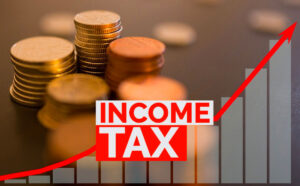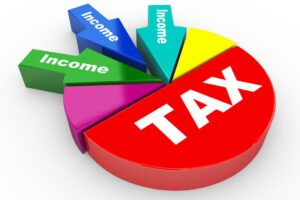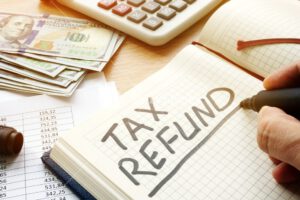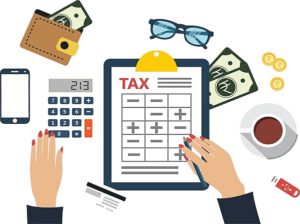-
Concept
Personal income tax (hereinafter referred to as PIT for short) is a compulsory state budget payment for individuals when they have taxable income in accordance with the tax law.
-
Taxpayers of personal income tax
According to Article 2 of the PIT Law promulgated and amended in 2012, there are regulations on 2 subjects subject to personal income tax as follows:
Subject 1: Resident individuals
Being a group of employees who have a house or regularly rent a house in Vietnam as prescribed by law and have a rental term of more than 183 days in a tax year or individuals who have a permanent residence in Vietnam for 183 days or more in a year or 12 months from the time of presence in Vietnam. It is known that the arrival date and departure date will be counted as 01 day.

For resident individuals, there are 2 cases in which personal income tax must be paid, namely:
- Individuals who sign labor contracts for 03 months or more
- Individuals who sign labor contracts for less than 03 months or do not sign labor contracts
Subject 2: Non-resident individuals
Being a group of people who are not eligible to become resident individuals is determined to belong to the group of non-resident individuals. Usually non-resident individuals are foreigners who come to Vietnam to live and work.
-
Personal income tax exemption
Taxpayers are exempt from PIT for a number of incomes as follows:
– Incomes from real estate transfer (including houses to be formed in the future, construction works to be formed in the future in accordance with the law on real estate business) between: husband and wife; natural father, mother and natural child; adoptive fathers and adoptive mothers with adopted children; father-in-law, mother-in-law and daughter-in-law; father-in-law, mother-in-law and son-in-law; grandfathers, grandmothers and grandchildren; grandfathers, grandmothers and grandchildren; siblings to each other.
In case real estate (including houses to be formed in the future, construction works to be formed in the future in accordance with the law on real estate business) created by a husband or wife during the marriage period is determined to be the common property of husband and wife, when the divorce is divided by agreement or ruled by the court, the division of this property is eligible for tax exemption.
- Incomes from the transfer of houses, residential land use rights and assets attached to residential land of individuals in case the transferor has only one house or residential land use right in Vietnam.
- Incomes from the value of land use rights of individuals who are allocated land by the State without payment or reduced land use levies in accordance with law.

In case an individual is entitled to land use levy exemption or reduction when allocating land, if the land area is transferred for land use levy exemption or reduction, he or she shall declare and pay tax on income from real estate transfer guided in Article 12 of this Circular.
- Income from inheritance and gifts being real estate (including houses and construction works formed in the future in accordance with the law on real estate business) between: husband and wife; natural father, mother and natural child; adoptive fathers and adoptive mothers with adopted children; father-in-law, mother-in-law and daughter-in-law; father-in-law, mother-in-law and son-in-law; grandfathers, grandmothers and grandchildren, grandfathers, grandmothers and grandchildren; siblings to each other.
- Incomes from agricultural land conversion to rationalize agricultural production but do not change the land use purposes of households and individuals directly engaged in agricultural production and assigned by the State for production.
- Incomes of households and individuals directly involved in agricultural production, forestry, salt making, aquaculture and fishing activities that have not been processed or have only been preliminarily processed into other products.
- Income from interest on deposits at credit institutions, foreign bank branches, interest from life insurance contracts; income from interest on Government bonds.
- Income from tax-exempt remittances is the amount of money received from abroad by individuals who are relatives who are overseas Vietnamese, Vietnamese who go abroad to work, work or study abroad and send money to relatives in the country;
In case an individual receives money from abroad sent by a relative who is a foreigner and satisfies the conditions for encouraging remittance of money to the country according to the regulations of the State Bank of Vietnam, he or she is also exempt from tax under the provisions of this Point.
The basis for determining tax-exempt income at this Point is papers proving the source of money received from abroad and the payment vouchers of the organization paying the money (if any).
- Income from salaries, wages for night work and overtime work is paid higher than salaries for working during the day and working hours according to the provisions of the Labor Code.
- Pensions paid by the Social Insurance Fund in accordance with the Law on Social Insurance; pension received monthly from the Voluntary Pension Fund.

Individuals living and working in Vietnam are exempt from tax on pensions paid from abroad.
- Scholarship income
- Indemnity from indemnity for life, non-life insurance and health insurance contracts; compensation for occupational accidents; compensation and support in accordance with the law on compensation, support and resettlement; State compensations and other compensations as prescribed by law.
- Income received from charitable funds permitted by competent State agencies to be established or recognized, operating for charitable, humanitarian and study promotion purposes not for the purpose of profit.
- Incomes received from foreign aid sources for charitable and humanitarian purposes in the form of government and non-governmental agencies approved by competent State agencies.
The basis for determining tax-exempt income at this Point is the document of the competent State agency approving the receipt of aid.
- Income from salaries and wages of Vietnamese seafarers received from working for foreign shipping lines or Vietnamese shipping lines for international transportation.
- Incomes of individuals who are ship owners, individuals with the right to use ships and individuals working on ships from the provision of goods and services directly in service of offshore fishery exploitation activities.
-
Personal income tax refund
Taxpayers are entitled to personal income tax refund in one of the following three cases
- The paid tax amount is greater than the payable tax amount;
- Individuals who have paid tax but have taxable incomes that are not enough to pay tax;
- Other cases under decisions of competent state agencies.
Conditions for personal income tax refund
The personal income tax refund applies to individuals who have registered and have a tax identification number at the time of submission of tax finalization dossiers.

For individuals who have authorized the tax finalization for income-paying organizations or individuals to make the tax finalization on their behalf, the tax refund of the individual shall be made through the income-paying organization or individual.
Income-paying organizations and individuals shall offset the overpaid and underpaid tax amounts of individuals. After clearing, if there is still an overpaid tax amount, it shall be cleared in the next period or refunded if there is a request for refund.
For individuals who are subject to direct declaration to the tax authority, they may choose to refund or clear tax in the next period at the same tax authority.
Note: In case an individual incurs a personal income tax refund but is late in submitting the tax finalization declaration as prescribed, no penalty shall be applied to the administrative violation of declaring tax finalization beyond the time limit.
-
Personal income tax payment rate
Depending on each type of income and taxable income level (total income minus non-taxable amounts, exempted amounts if any), the PIT rate payable is as follows:
- Income from salaries and wages is specified in Article 7 of Circular 111/2013/TT-BTC as follows:
The PIT rate payable for people earning income from salaries and wages is calculated on a partial progressive. In other words, the higher the taxable income, the higher the payable tax amount (the higher the tax rate), specifically including 07 tax levels: 5%, 10%, 15%, 20%, 25%, 30% and the highest level is 35%.
- For income when transferring real estate, it is 2% of the transfer price as prescribed in Clause 4, Article 12 of Circular 111/2013/TT-BTC.

-
How to calculate personal income tax
For resident individuals
- For resident individuals who sign labor contracts for 03 months or more
Pursuant to the Law on Personal Income Tax 2007 and Articles 7 and 9 of Circular 111/2013/TT-BTC, PIT for resident individuals who sign labor contracts for 03 months or more is determined according to the following formula:
Payable PIT = Taxable income x Tax rate
Accordingly, in order to calculate the payable tax amount, it is necessary to calculate the taxable income and tax rate, specifically:
– Taxable income:
Taxable income = Taxable income – Deductions [1]
In which,
Taxable income = Total income – Exempt amounts [2]
– Tax rate:
The tax rate from salaries and wages for individuals who sign labor contracts of 03 months or more is applied in a gradual manner, specifically:
| Tax tiers | Taxable income/year
(million VND) |
Taxable income/month
(million VND) |
Tax Rate
(%) |
| 1 | Up to 60 | Up to 5 | 5 |
| 2 | Over 60 to 120 | Over 5 to 10 | 10 |
| 3 | Over 120 to 216 | Over 10 to 18 | 15 |
| 4 | Over 216 to 384 | Over 18 to 32 | 20 |
| 5 | Over 384 to 624 | Over 32 to 52 | 25 |
| 6 | Over 624 to 960 | Over 52 to 80 | 30 |
| 7 | Over 960 | Over 80 | 35 |

- Failing to sign a labor contract or signing a labor contract for less than 03 months
Pursuant to Point i, Clause 1, Article 25 of Circular 111/2013/TT-BTC, a resident individual who signs a labor contract for less than 03 months or does not sign a labor contract but has a total income payment of VND 2 million/time or more must deduct tax at the rate of 10% of income (deducted before payment).
In other words, individuals who do not sign labor contracts or sign labor contracts for less than 03 months but earn income from salaries and allowances of VND 2 million or more each time they receive must pay tax at the rate of 10%, except for the case of making commitments according to Form 08/CK-TNCN if eligible.
The payable tax amount is calculated as follows:
Payable personal income tax = 10% x Total income before payment

For non-resident individuals
Payable PIT = Taxable income from salaries and wages x Tax rate (20%)
In particular, taxable income from salaries and wages of non-resident individuals is determined as for personal income taxable income from salaries and wages of resident individuals under the guidance in Clause 2, Article 8 of Circular 111/2013/TT-BTC.
The determination of personal income taxable income from salaries and wages in Vietnam in case an individual does not reside and works in Vietnam and abroad at the same time but cannot separate the income generated in Vietnam shall be carried out according to the following formula:
For cases where foreigners are not present in Vietnam
| Total income generated in Vietnam
|
= | Number of working days for work in Vietnam
Total number of working days in a year
|
x | Income from global wages and wages (before tax) | + | Other taxable income (before tax) arising in Vietnam
|
In which: The total number of working days in a year is calculated according to the regime specified in the Labor Code of Vietnam.
For cases where foreigners are present in Vietnam
| Total income generated in Vietnam
|
= | Number of days in Vietnam
365 |
x | Income from global wages and wages (before tax) | + | Other taxable income (before tax) arising in Vietnam
|
Other taxable incomes (before tax) arising in Vietnam in the above cases are other benefits in cash or non-cash that the employee is entitled to in addition to the salary or wages paid by the employer or paid on behalf of the employee.
Above is the content of KALF’s advice on Personal Income Tax and related issues. All of our above advice is based on applicable legal regulations. If you have any questions or requests about legal issues, please contact us for timely answers.




